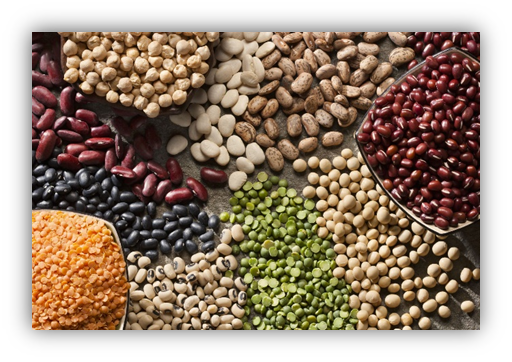Holistic Habits by Cheryl A. Mothes, Ph.D. Natural Health Nutrition Counselor
Warm Up with Plant-Based
Soups:
- Corn Chowder
- Cheesy Broccoli Soup
- Three-Bean Soup with Turmeric and Lentils

All these recipes are
plant-based and come from Dr. Greger's "How Not to Diet" cookbook.
You can find the full recipes and instructions here: https://nutritionfacts.org/video/a-trio-of-cozy-seasonal-soups/
Do not miss Dr. Greger's
interview on the "Exam Room Podcast" where he discusses his latest
book, "How Not to Age." You can listen to it here: https://podcasts.apple.com/us/podcast/dr-michael-greger-inside-how-not-to-age/id1312957138?i=1000637530527
The Power of Legumes:
Legumes, which include
beans, peas, lentils, and chickpeas, should be a staple in your daily diet.
They are packed with nutrients, protein, and fiber, all crucial for optimal
health and function. Legumes also support a healthy gut microbiome, leading to better
immune function and reduced inflammation. Shockingly, only 10% of Americans
consume enough fiber!
Here are some ways to
add more legumes to your diet:
- Blend them
into smoothies and salads.
- Enjoy hummus
as a dip for vegetables or spread on dishes.
- Add lentils
to soups and stews.
Aim for 3 servings of
legumes daily. Remember, it is Meatless Monday, and there are countless
delicious plant-based, bean-rich recipes available to help you live a longer
and stronger life!
Boost Your NAD Levels
Naturally:
NAD, a complex molecule
crucial for health and lifespan, can be naturally boosted through various
means. While numerous ineffective supplements claim to increase NAD, simple
lifestyle changes can make a significant difference.
Here are some natural
ways to boost NAD levels:
- Exercise: Riding a stationary bike for just
three weeks or engaging in resistance training can increase NAD levels in
your muscles by 127%!
- Reduce
inflammation and oxidation: Eating
legumes, any plant with pod-like lentils, beans, peas, and peanuts, is a
great way to achieve this. Studies suggest that consuming legumes may be
the most significant dietary predictor of lifespan. Start incorporating
more beans into your diet today!
An
Apple a Day Keeps the Doctor Away (and Spinach Too!):
Eating just one apple daily can reduce your risk of
death by 35%! This is likely due to the flavonoids, phytonutrients in apples
that improve artery function and lower blood pressure, ultimately reducing the
risk of heart disease and stroke. However, it is crucial to eat the peels, as
they contain the majority of the flavonoids. Studies show that higher flavonoid
levels in the bloodstream significantly improve artery function almost
instantly.
This age-old saying holds true! Similarly, spinach
offers similar benefits, explaining Popeye's remarkable strength. Make apples
and spinach staples on your grocery list for a healthy and happy Wednesday!
Excess Body Fat and the Dangers of Added Sugars:
An estimated 91% of adults and 69% of children in the United States are considered "overfat," meaning they have excess body fat that can negatively impact their health. Even individuals with a normal weight may carry dangerous visceral fat around their abdomen.How can you tell if you are at risk? A simple measurement is
your waist circumference. If it is more than half your height, you are at
increased risk for health problems. For example, someone who is 5 feet 8 inches
tall should have a waist circumference of no more than 34 inches.
One major contributor to this widespread obesity epidemic is the
excessive consumption of added sugars. The average American consumes a
staggering 25 teaspoons of added sugar daily, translating to approximately 400
unnecessary calories. By eliminating these added sugars and reading food labels
carefully, you can achieve weight loss and improve your overall health.
Calculate Your "Actual
Age":
We have mentioned this valuable tool before, and it is worth
reiterating. This 35-question online assessment calculates your "actual
age" based on your answers, offering valuable insights into factors
impacting your longevity. It is not just about the score; studying the
questions themselves highlights the habits and choices that truly are effective
in living a long and healthy life. Check it out on the Longevity Playbook
website this fantastic Friday!
Recipe Recommendations:
- Smoky
cumin and chipotle carrot soup by Eydie Desser: https://gardenofeydie.com/recipes/smoky-cumin-and-chipotle-carrot-soup/
- "Fiber
Fueled" book by Dr. Will Bulsiewicz: https://www.pcrm.org/term/gut-bacteria
Dr.
Greger's "How Not to Age": Key Points and Plant-Based Benefits
Dr. Greger's
"How Not to Age" dives deep into the science of aging, summarizing
extensive clinical research into eight anti-aging concepts. Last week, we
discussed how reducing protein intake may contribute to a longer, healthier
life. New research suggests that most of these benefits might come from
restricting methionine, a potentially toxic amino acid.
To
lower methionine intake:
- Reduce
overall calorie and protein intake.
- Shift
protein sources from animal to plant-based options.
Interestingly,
cancer cells exhibit a "methionine addiction," making fruits and
vegetables, naturally devoid of methionine, powerful allies in the fight
against cancer. Fish and poultry contain the highest levels of methionine,
while plants boast the lowest.
Beyond cancer
risk reduction, vegans also experience a significantly lower risk of
diabetes. So, consider this Meatless Monday a reminder to embrace the power
of plant-based foods to improve your overall well-being!
February 6th
marks National Oatmeal Day, highlighting the incredible health benefits of this
superfood. Regularly consuming oatmeal can help reduce the risk of both
diabetes and heart disease. However, many people significantly diminish
oatmeal's health potential by adding brown sugar and other unhealthy toppings.
Here
is how to enjoy a healthier and more delicious oatmeal experience:
- Opt
for steel-cut or rolled oats over instant varieties.
- Prepare
oatmeal with water and add chopped apples, cinnamon, and walnuts for a
quick and flavorful breakfast.
- Feel free to
experiment with other combinations like bananas with cloves and almonds,
pineapple with coconut and pecans, or a blueberry and strawberry medley!
Understanding
Insulin Resistance and the Role of Plant-Based Diets:
When discussing
insulin resistance, we must consider branched-chain amino acids (BCAAs),
often referred to as "bad actors." These amino acids accumulate
within muscle cells, hindering insulin function. Meat, dairy products, and eggs
are significant sources of BCAAs, potentially explaining why consuming these
foods can contribute to insulin resistance, increased diabetes risk, and
related health problems.
Here is some
encouraging news: studies reveal that simply replacing just two servings of
meat with beans per week can significantly improve blood sugar levels,
lower cholesterol, and reduce triglycerides. However, be wary of BCAA
supplements marketed to boost muscle mass – research suggests they achieve the
opposite!
Embrace
Plant Power for Optimal Health:
Dr. Greger's
latest book, "How Not to Age," highlights remarkable findings from a
study involving individuals who transitioned to a plant-based diet. These
participants experienced significant reductions in insulin resistance, fasting
blood sugar levels, and overall insulin levels.
Interestingly,
adding egg whites to their diet led to a dramatic 60% increase in insulin
within just four days! Similarly, including tuna in mashed potatoes resulted in
a 50% higher insulin reaction compared to consuming potatoes alone. On the
bright side, adding broccoli to mashed potatoes resulted in a 40% reduction
in insulin reaction within the first 30 minutes of eating!
These findings
emphasize the transformative power of incorporating fruits, vegetables, nuts,
seeds, beans, and grains into your diet. Remember, "How bad do you want to feel good?"
Join
the Plant-Powered Supper Club:
Are you
interested in learning more about incorporating plant-based meals into your
diet or improving your health through nutrition? If so, consider joining the
Plant-Powered Supper Club, held on the first Thursday of every month at Saint
Francis Medical Center, starting at 6 PM. Connect with others, share recipe
ideas, and discover the potential of a plant-based lifestyle for yourself! For
more information, call 573-331-5312 or attend their next meeting on the
first Thursday of any month at 6 PM.








No comments:
Post a Comment